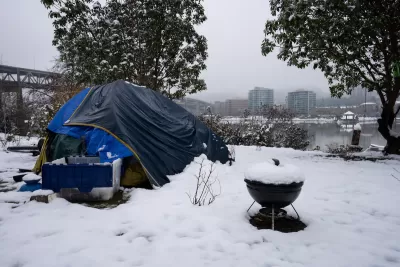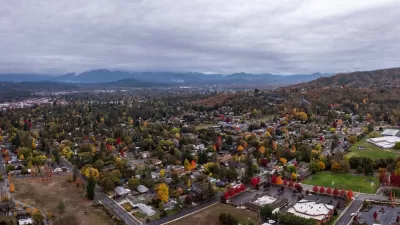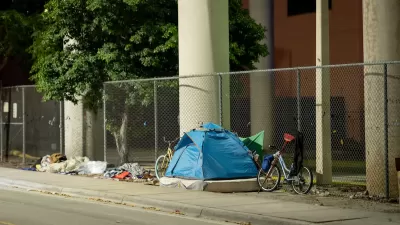Unhoused residents can sleep on public property when no shelter space is available, but still face penalties for violating new regulations or not moving into shelter if offered.

The Portland, Oregon city council approved a new policy that regulates sleeping and camping on public property.
As Alex Zielinski explains in an article for Oregon Public Broadcasting, the new policy eases a camping ban passed last year. “The proposal allows people experiencing homelessness to camp on public property if no shelter beds are available, which is often the case in Multnomah County. But it limits what people can do while camping. For instance, the policy prohibits people from using a propane heater, digging into the ground, starting a fire, selling bicycles or car parts, or blocking access to private property while camping.”
The policy includes penalties of up to $100 or seven days in jail for violations. “People could also face the same penalties if an outreach worker with the city informs them that shelter space is available, but they refuse to pack up their camp.”
An upcoming Supreme Court decision on a case from Grants Pass, Oregon could change how cities can regulate outdoor sleeping. “If the court rules in Grants Pass’ favor, Portland wouldn’t be able to immediately begin penalizing people camping in public spaces. It would still need to adhere to a state law that directs cities to establish rules that allow for public camping if there isn’t shelter space available.”
FULL STORY: Portland unanimously passes new regulations for camping on public property

Maui's Vacation Rental Debate Turns Ugly
Verbal attacks, misinformation campaigns and fistfights plague a high-stakes debate to convert thousands of vacation rentals into long-term housing.

Planetizen Federal Action Tracker
A weekly monitor of how Trump’s orders and actions are impacting planners and planning in America.

Chicago’s Ghost Rails
Just beneath the surface of the modern city lie the remnants of its expansive early 20th-century streetcar system.

Bend, Oregon Zoning Reforms Prioritize Small-Scale Housing
The city altered its zoning code to allow multi-family housing and eliminated parking mandates citywide.

Amtrak Cutting Jobs, Funding to High-Speed Rail
The agency plans to cut 10 percent of its workforce and has confirmed it will not fund new high-speed rail projects.

LA Denies Basic Services to Unhoused Residents
The city has repeatedly failed to respond to requests for trash pickup at encampment sites, and eliminated a program that provided mobile showers and toilets.
Urban Design for Planners 1: Software Tools
This six-course series explores essential urban design concepts using open source software and equips planners with the tools they need to participate fully in the urban design process.
Planning for Universal Design
Learn the tools for implementing Universal Design in planning regulations.
planning NEXT
Appalachian Highlands Housing Partners
Mpact (founded as Rail~Volution)
City of Camden Redevelopment Agency
City of Astoria
City of Portland
City of Laramie





























